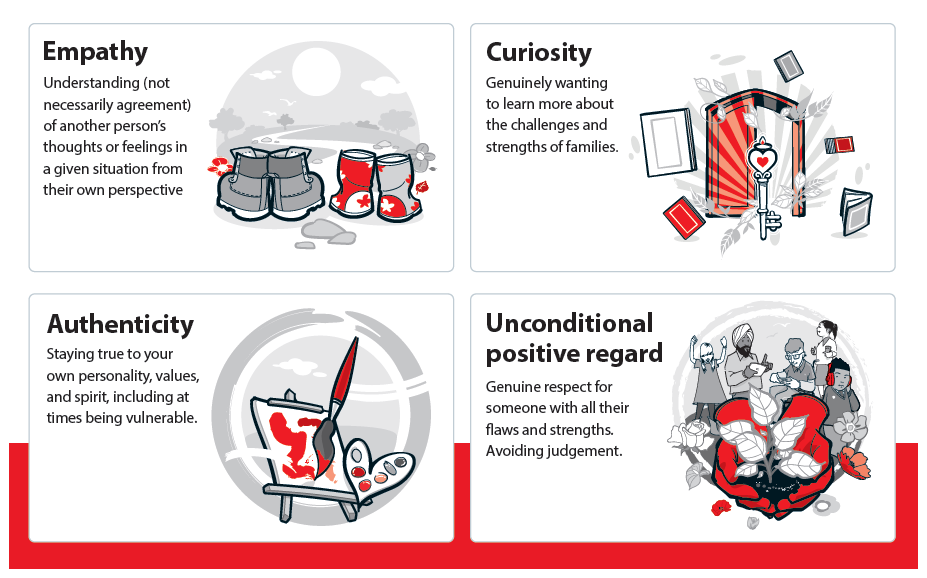Maintaining relationships can be hard work with our nearest and dearest, let alone between schools and parents*. A DSL’s toughest conversations tend to be with parents, where positive engagement has a key influence on children’s outcomes. So, it is surprising that we don’t dedicate more time, training and support to this area.
Working Together to Safeguard Children added a helpful new section on effective principles for working with parents. In this series of blog articles, we will explore what they are and how they relate to school safeguarding practice.

PRINCIPLE 1: Effective partnership working with parents and carers happens when practitioners build positive, trusting and co-operative relationships.
While you likely focus on relational practice with children in school, it’s equally vital to nurture these relationships with parents and carers. Reflect on your current practices:
- What do your relationships with parents currently look like?
- How do parents describe these?
- Who do you struggle to engage with and why?
- What regular and ongoing opportunities do you create for all parents to be involved with, get to know and communicate with the school?
Look at the points below and consider, to what extent do you adopt these, and what evidence do you have that this is the case?
-png.png?width=680&height=461&name=Effective%20partnerships%20with%20parents%20-%20visual%20selection%20(1)-png.png)
- Approach all families with empathy, unconditional positive regard and creativity acknowledging families' unique circumstances and needs
- Avoid ‘othering’. Focus on finding similarities between yourself and parents to create more authentic and empathic connections.
- Avoid reinforcing shame and blame. Parents will be doing what they can within the confines of their own resources, motivation and capacity. Working collaboratively allows them to feel seen, heard and understood, and when this happens, they are much more likely to positively engage.
- Use strengths-based approaches. Identify and build on family strengths to effect positive change in other areas. For example, where a child is coming to school late 60% of the time, find out what happens on the days when they arrive on time, and what can be learned and transferred from these situations.
- Understand families’ contexts. Families may exist within complex webs of trauma and adversity such as poverty, trauma or bereavement. To help improve outcomes for children, acknowledge these with compassion to foster trust and build positive relationships.
- Know your parents. Parents are diverse groups with varying needs, consider barriers such as mobility issues, language barriers, cultural norms, or environmental differences that ensure that all parents feel included.
- Avoid bias and stereotypes. Unfair judgements, whether conscious or unconscious, can harm relationships. Uphold your school values with all members of the school community by ensuring all are treated with respect and fairness.
- Collaborate and work with parents. Shift from “doing safeguarding to” parents to working collaboratively with them. Build trust by listening and helping families find solutions that meet their unique needs.
None of this is at odds to or should distract from the utmost important principle in safeguarding: that the child’s welfare is paramount. Any concerns staff have, that harm is being caused or is likely to be caused to a child by abuse, neglect or exploitation, must be responded to immediately as per your safeguarding policy and procedures. However, you can still challenge concerns through empathy, respect, and non-judgmental dialogue to positively impact our relationships with parents, and ultimately outcomes for children.
To find out more about relational practice with parents, please visit relationalpractice.lgfl.net. Of particular interest may be our template strategy on parent partnership. We also offer a FREE 1-day training course for LGfL schools on “Courageous conversations and relational approaches to safeguard children”, please book here: safetraining.lgfl.net.
Stay tuned! The next blog article will explore the power of language we use with and about parents.
*In this blog, for conciseness we refer to anyone who cares for someone under the age of 18, as a parent. However, in doing so we recognise that those who look after children are extremely diverse with regards to their relationship to children (e.g. family member, foster carer, family friend etc) and their own individual characteristics.
